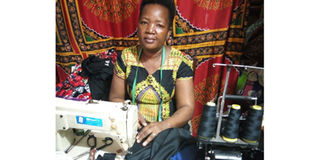Nakibogo’s 15-year tailoring career

Monica Nakibogo in her workshop. Her tailoring career over 15 years. PHOTOS BY CHARLOTTE NINSIIMA.
What you need to know:
Sewing for a living. It is hard to imagine that with a sewing machine, one can pay the bills and live a modest life. Charlotte Ninsiima shares the story of Nakibogo who has spent 15 years sewing.
Although she grew up despising tailoring, it turned out to be Monica Nakibogo’s source of income for the last 15 years.
“Growing up, my dream was to become a nurse. However, I did not get a chance to complete school because of lack of funds. My father insisted that I sign up for a course in tailoring, an idea I greatly despised. However, after the training, I made my first outfit that I loved so much,” she say.
Nakabugo adds: “I gradually learnt to like tailoring and overtime, I became passionate about the work I did. I went for training for two years from 1983 and later, I obtained a diploma in tailoring from Ethiopia.”
Experience
She says: “Over the years, I have obtained experience in sewing African fabric, bridal wear, and uniforms for school going children, waiting staff and migrant workers. I also make sweaters and casual clothes.”
One of her highlights in her tailoring career is working with Lady Charlotte fashion house.
She has also gained trust of several other fashion enthusiasts, having worked in many bridal outlets, until she saved enough capital to start her own store.
Nakibugo says the fashion industry comes with new trends that require tailors to learn within the shortest time, in order to satisfy clients’ needs and remain competitive.
Challenges
“You must be a quick learner and adapt to new fashion trends.” She says fashion designers must have an eye for stylish and trending outfits, sketch them out and tailor them within a short time.
Despite the effort she invests in her work, another challenge she faces is that the business does not bring in attractive returns. “Most people do not value our work. Sometimes, I spend sleepless nights working on clients’ orders, but the pay is not commensurate. If you ask a client to pay Shs500,000 for a uniquely designed dress, they will run away. They do not value the tailoring industry and our expertise,” she explains.
While most tailors are portrayed as serial liars who never deliver on time, Nakibugo says she labours to meet the expectations of her customers. She says she respects clients because through her work, she has been able to pay bills and cater for her family.
Marketing and sales
She says: “I get clients through referrals. If you treat a client very well, she or he will refer you to more customers. Even the best contract that I am working on currently of uniforms for workers in the Middle East was through a referral. I am also very fast. When I decide to work, I can make five pieces a day or even 10 uniforms. Clients do not want tailors who delay with their outfits.” To supplement her income, Nakibugo sells African fabric (bitenge), airtime, drinks and cakes at her workshop.
Advice
Nakibugo says there is a lot in the world one can do to earn. “There are women who wait for their husbands to provide everything for the family, yet they can enrol for short courses in tailoring, baking, catering to supplement family incomes. If I was depending on a man, I would not be here. Kampala today has more female breadwinners. Start with what you have. Imagine how you will survive when you husband loses a job,” she advises.
Determined
After working in several bridal outlets, a good samaritan jumpstarted her career by donating one sewing machine and paying her rent for six months along Buganda Road. She started with capital worth Shs20,000 which she used to buy threads, needles, tape measure and other items. The 52-year old says, “I have educated and offered financial support to all my siblings- who are eight in number and they all completed their studies. She boasts of four sewing machines and currently employs four staff. She plans to expand her business and start training youth in tailoring.




